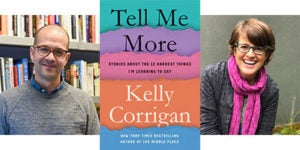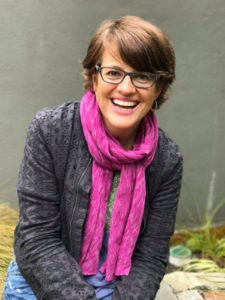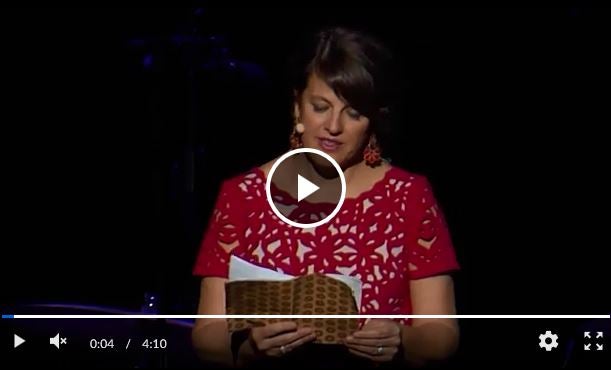TELL ME MORE: Random House’s Andy Ward on Kelly Corrigan’s New Book
 In her new Random House book, TELL ME MORE: Stories About the 12 Hardest Things I’m Learning to Say, New York Times bestselling author Kelly Corrigan swings between meditations on life with a preoccupied husband and two mercurial teenage daughters to profound observations on love and loss. Kelly’s editor, Andy Ward, Vice President, Editor in Chief, Random House, was closely involved with the creation of this collection of stories and shares insights into his impressions of Kelly’s voice on the page, their editor/author working relationship, and who will find her new stories most beneficial in this Three Questions for an Editor interview.
In her new Random House book, TELL ME MORE: Stories About the 12 Hardest Things I’m Learning to Say, New York Times bestselling author Kelly Corrigan swings between meditations on life with a preoccupied husband and two mercurial teenage daughters to profound observations on love and loss. Kelly’s editor, Andy Ward, Vice President, Editor in Chief, Random House, was closely involved with the creation of this collection of stories and shares insights into his impressions of Kelly’s voice on the page, their editor/author working relationship, and who will find her new stories most beneficial in this Three Questions for an Editor interview.
 In TELL ME MORE, Kelly Corrigan writes about experiences that are both intensely personal and universally relatable. What are the keys to her ability to draw readers into her life and prompt them to examine their own?
In TELL ME MORE, Kelly Corrigan writes about experiences that are both intensely personal and universally relatable. What are the keys to her ability to draw readers into her life and prompt them to examine their own?
Three main keys, I’d say: humor, intelligence, and honesty. (Okay, and a fourth: a rare, instinctive sense of what is interesting in any given scene or moment. Good observers tell good stories.) Kelly knows how to draw a compelling scene, but it’s her honesty – her vulnerability and openness as a narrator, her willingness to portray her life as, at times, something of a mess – that resonates for me. Kelly doesn’t pretend to hold the secret to a happy life. She doesn’t pretend her family is perfect. She doesn’t gloss over her mistakes (see: “It’s Like This”) or her less-becoming impulses (“I Was Wrong”). That kind of honesty keeps the reader from feeling defensive, and maybe encourages them to engage in some introspection of their own.
How would you describe the editorial process involved in putting TELL ME MORE together with the author – in terms of shaping the narrative and organizing the flow of the chapters?
I would describe it as highly iterative. As Kelly drafted and redrafted, the list of phrases in the book expanded and contracted and expanded again, from 10 to 8 to 14 to 12. The phrases themselves also shifted and evolved, as Kelly wrote her way down to the essence of things. One essay, “You Got This,” eventually morphed into “Good Enough,” which is less of a pep-talky bromide and more of a portal into the idea of acceptance. Another one of the essays, “I Was Wrong,” was initially titled “I’m Sorry,” and Kelly and I went back and forth on this, with me arguing that “I’m Sorry” was more universal and, thus, more relatable, and Kelly arguing that “I Was Wrong” was more powerful and harder to say and, in fact, far more meaningful in that it suggested real accountability. She was right, of course. That’s a battle I was only too happy to lose. The book is better because of it.
Who do you think will get the most out of reading this book and why?
Given my biases here, that’s a hard one to answer objectively. But in that spirit, I guess I’d say: anyone with kids, anyone who has had a brush with mortality, anyone who bolts awake at 3am, convinced that they are failing on every possible front, or anyone who is at the time of their lives when they are dealing with aging or infirm parents, and all of the pain and confusion and bewildering existential stuff that goes along with that. That’s an extremely wide swath of people, I know, but then again, this is a book that is ultimately about acceptance of our flaws, the desire to be better, and the search for what is truly important in life. I’m calling that universal.
Kelly Corrigan reads an excerpt from the “I Love You” chapter of TELL ME MORE:



